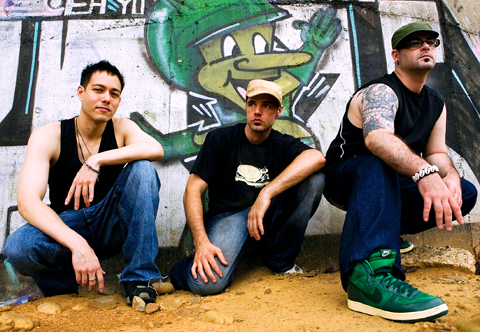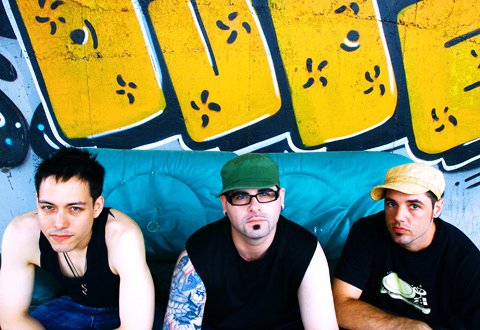When an interview with THC - Taipei Hip-hop Crew (H中P在台北) - turns into a three-hour discussion of art, philosophy and the Mayan calendar, it's clear the members of this group break the hip-hop mold: they've substituted mysticism and intellectuality for misogyny and violence, but without sacrificing the edginess or profanity.
THC plays at Roxy Vibe Live House's opening party tonight. Vibe, the notorious meat market/disco microcosm of the expat community, has been remodeled and will now be hosting live bands on weekends until 1am (or 2am for special events), before reverting back to its old ways as a disco with a DJ.

PHOTO COURTESY OF KLOIE PICOT
Like many expat bands here, THC met through an open-mic night. Zach Touzin, aka MC Babble On, hosted the night, and Kyle Sveinson, aka DJ Vast, provided the music. "We tried to make it no holds barred, something fresh and underground where you could say anything" said Babble On of the now-defunct night at the former Living Room, which is under new management as Center Stage.
The Crew was formed when Touzin and Sveinson met Elliot Tsai (蔡一暐), aka Tha Shaman (玄武), two years ago and gave up the open-mic night to focus on their own music. They now spend three to four days a week making music in Stoneworks Studios, which Vast built in his apartment.
It's refreshing to listen to a band whose members make all their own beats. The first sample of the Crew's new CD, Countdown to Unsound - a sparking lighter followed by a bubbling noise and a drawn-out exhalation - is homemade, said Vast, who studied sound engineering in Canada.

PHOTO COURTESY OF KLOIE PICOT
Shaman, who hails from Texas and also makes beats, said the CD's title is a reference to 2012, when some believe the Mayan calendar will end with apocalyptic repercussions.
THC performs in three languages, English, French and Mandarin, with the English and Chinese lyrics following the same rhyme scheme in some songs, as in the title track from the new album: "Flows that hit the ground, we don't fuck around/ The THC, we gonna break it down anyhow/ Wangji le fannao, huijia zai dapao/ Women de gongzuo jiu shi rang nimen high dao gaocao."
The last part of the verse translates as: "Forget your worries, go home and get laid" (忘記了煩惱,回家再打炮)/ "Our job is to make you so high that you climax" (我們的工作就是讓你們high到高潮). This is still hip-hop, after all.
Hip-hop/rock band hybrid outfit, Dr Reniculous and the Skallunz, and DJ Marcus Aurelius join THC for the opening party of Roxy Vibe Live House tonight.
"We all know Vibe now has the reputation of being an after-hours sleazy joint. We want to change that," Roxy Vibe Live House stage manager Gregory Dion Russell said in an interview on Monday.
Vibe's DJ booth is a central focus of one end of the dance floor, with a fully equipped space for live bands at the other end. The laser light effects were very colorful and psychedelic last weekend and made the dance floor surreal. Russell has a killer lineup for the opening weekend, with the Money Shot Horns, High Tide, and the Deadly Vibes playing tomorrow night.
Vibe's debut as a live house comes three months after the opening of Velvet Underground (VU Live House), which Russell also manages. VU is reminiscent of Zeitgeist or even a smaller version of The Wall (這牆), with a long stage that takes up one entire side of the building. The dance floor separates the stage and tables with comfortable chairs, giving it that authentic live-music venue feeling. The stage is large enough for even big groups like Skaraoke, which plays on Saturday.
Russell said that Vibe is likely to "attract people who are up for the party thing whereas VU will attract the more music savvy customers. They are both good quality venues with good equipment."
The Sin City party to celebrate the opening of Roxy Vibe Live House happens tonight at Vibe, B1, 155, Jinshan S Rd Sec 2, Taipei City (台北市金山南路ㄧ段155號B1). With THC, Dr Reniculous and the Skallunz, and DJ Marcus Aurelius. Performing tomorrow are the Deadly Vibes, the Money Shot Horns and High Tide. Cover is NT$300 and includes one drink. The shows run from 10pm and 2am. Vibe stays open until 7:30am.
VU Live House (地下絲絨) in Ximending, B1, 77, Wuchang St Sec 2, Taipei City (台北市武昌街二段77號B1) also has a great lineup this weekend, with newcomers Auto de Fe and Sons of Homer tonight, and Rabbit is Rich (兔子很有錢) with Skaroake tomorrow. Cover is NT$300 and includes one drink. From 10pm until late.

In the March 9 edition of the Taipei Times a piece by Ninon Godefroy ran with the headine “The quiet, gentle rhythm of Taiwan.” It started with the line “Taiwan is a small, humble place. There is no Eiffel Tower, no pyramids — no singular attraction that draws the world’s attention.” I laughed out loud at that. This was out of no disrespect for the author or the piece, which made some interesting analogies and good points about how both Din Tai Fung’s and Taiwan Semiconductor Manufacturing Co’s (TSMC, 台積電) meticulous attention to detail and quality are not quite up to

April 21 to April 27 Hsieh Er’s (謝娥) political fortunes were rising fast after she got out of jail and joined the Chinese Nationalist Party (KMT) in December 1945. Not only did she hold key positions in various committees, she was elected the only woman on the Taipei City Council and headed to Nanjing in 1946 as the sole Taiwanese female representative to the National Constituent Assembly. With the support of first lady Soong May-ling (宋美齡), she started the Taipei Women’s Association and Taiwan Provincial Women’s Association, where she

Chinese Nationalist Party (KMT) Chairman Eric Chu (朱立倫) hatched a bold plan to charge forward and seize the initiative when he held a protest in front of the Taipei City Prosecutors’ Office. Though risky, because illegal, its success would help tackle at least six problems facing both himself and the KMT. What he did not see coming was Taipei Mayor Chiang Wan-an (將萬安) tripping him up out of the gate. In spite of Chu being the most consequential and successful KMT chairman since the early 2010s — arguably saving the party from financial ruin and restoring its electoral viability —

It is one of the more remarkable facts of Taiwan history that it was never occupied or claimed by any of the numerous kingdoms of southern China — Han or otherwise — that lay just across the water from it. None of their brilliant ministers ever discovered that Taiwan was a “core interest” of the state whose annexation was “inevitable.” As Paul Kua notes in an excellent monograph laying out how the Portuguese gave Taiwan the name “Formosa,” the first Europeans to express an interest in occupying Taiwan were the Spanish. Tonio Andrade in his seminal work, How Taiwan Became Chinese,